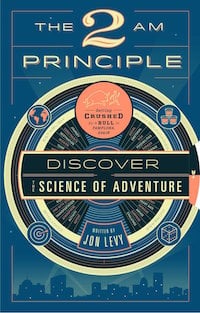
Believe me, it is possible to create your own adventures in life [1]. But having adventures isn't limited to vacations or special occasions. How you design your life and who you surround yourself with can greatly impact your ability to break out of your comfort zone and live an exciting life.
My research and wild stories are shared fully in my book, The 2AM Principle: Discover the Science of Adventure [2]. WARNING: Reading it will change everything you thought you knew. These five secrets will help you design a life that is happier, more exciting, and more fulfilling.
1. Stop hanging out with people who cause drama.
Drama queens — you can identify them by their tendency to drink too much, spread gossip like wildfire, and routinely spark heated fights. Your best friend may be one, but no matter how close you think you are to them, distance yourself from those drama queens when you want to have a fun adventure. They will eventually wreak havoc. Leading a fulfilling, exciting, and adventurous life means leaving them behind. It may seem harsh, but drama addicts can't help themselves.
Allowing drama into your life doesn't just negatively impact you either. Their negative energy will spread like a germ, infecting your entire network of friends and loved ones, then their network, and so on. Researcher Nicholas Christakis studied this phenomenon and found that everything from obesity to voting behavior and even emotions like happiness can be contagious [3], spreading across our social networks up to four degrees away. In other words, if you have an obese friend, your chances of obesity increase by 45 percent, your friends' chances increase by 25 percent, your friends' friends' by 10 percent, and your friends' friends' friends' by 5 percent. Instead of drama, surround yourself with people who are laid-back, up for anything, love to have fun, and encourage you to step out of your comfort zone.
2. Set clear goals or missions.
When you are at work, you have a goal. You should have one to push your life forward. A goal should be interesting and challenging but not out of your reach. For instance, having fun isn't a goal. It's a byproduct of an experience.
When you set a mission, make sure it follows the Goldilocks principle: Too easy and it is boring. Too hard and you won't try. But, if it is somewhere in between and pushes you outside your comfort zone, it is exciting. For example:
- Too easy: Visit five bars tonight.
- Too hard: Get free airline tickets around the world for you and your friends. For most of us, this is such a stretch we don't know where to begin.
- Just right: Go out and get all of your drinks for free. This will likely force you to have interesting conversations and meet new people and opens you up to a range of experiences.
3. Say Yes!
When opportunities come your way, even if you don't know what to expect or think you may not enjoy it, say "yes!" Life is more exciting and interesting with a diversity of experience. Our brains operate differently when exposed to things that are novel and exciting.
Grey's Anatomy [4] creator and self-described introvert Shonda Rhimes tested this theory for a year. According to Rhimes, she said yes to everything [5], even if it terrified her. What she discovered was that the experiment had opened her up and changed her. She was more interesting and comfortable in social settings and more successful in her career. Saying yes will not only enrich your life, but inspire and enable you to have better relationships and career success.
4. Be willing to be uncomfortable.
When was the last time that you did something that scared you? If something scares you, that's probably a great reason to do it. (Unless it is illegal or highly likely to kill you. Weigh the risks and use good judgment.)
Sticking within your comfort zone may make you feel safe, but it won't help you succeed. It won't push you to grow, and it won't lead to an adventure. Living an exciting and remarkable life happens at the edge of your comfort zone. You can't grow without crossing that threshold. When you push boundaries, you come through the experience a different person than you were at the beginning. The gift of an adventure isn't just the great memories and stories, it is the person that you become as a result.
5. End adventures on a positive note.
Research has proven that we don't remember how long we enjoyed an experience. What we remember is the peaks of the experience and the end. Psychologist Daniel Kahneman called it the peak-end theory [6]. It explains why an otherwise enjoyable date will be remembered as a miserable one if in the last few seconds, your date sticks you with the bill, says something inconsiderate, or commits another hard-to-redeem offense.
When having a fun night out, people often want to extend it, hoping that it will get even better. However, it generally turns out deteriorating into something unremarkable. Many times having an ending that spoils the whole experience makes you less willing to participate in the future. The key to remembering experiences positively is to end on a good note, which may mean ending it early.
 [7]
[7]
For more science-backed tips to live an exciting and fulfilling life and outrageous stories, pick up a copy of The 2 AM Principle: Discover the Science of Adventure [8], on sale now.